Civil Liberties, Criminalizing Dissent, Human Rights, Surveillance, Truth to Power, War Resister
Podcast: Play in new window | Download

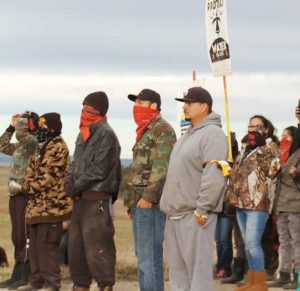
Legislation Criminalizing Protests
Throughout the nation, a rash of new bills are being introduced that increase the criminal penalty for the act of protesting. They have been in part inspired by the high-profile protests at Standing Rock, and also by model legislation drafted by the conservative and influential American Legislative Exchange Council. ALEC’s bills are designed to protect corporate interests. A new report from Greenpeace USA reveals how Energy Transfer Partners or ETP, the company behind the Dakota Access pipeline, with the fossil fuel industry, lobbied for legislation aimed at restricting and criminalizing protest. The report finds abuses on human rights, freedom of speech and faulty operations from the company.
ETP practices are destructive for the planet, for communities and for the health of democracy in the US. They have hired private security firms that surveil and infiltrate activist groups, advocated for laws that restrict the right to protest, or moving forward with pipeline projects against the will of Indigenous people and landowners, ETP is the poster child for unchecked corporate power. Annie Leonard, Executive Director at Greenpeace USA calls their projects lightning rods for controversy.
The report, Too Far, Too Often: Energy Transfer Partners’ Corporate Behavior On Human Rights, Free Speech, and the Environment, details how ETP lobbied for anti-protest legislation. It also shows how the company uses the courts and Strategic Lawsuits Against Public Participation (SLAPPs) to intimidate opponents of the Dakota Access pipeline project. In August 2017, ETP sued Greenpeace entities and others for USD $900 million, using RICO laws to claim that a collection of environmental groups and Indigenous allies constituted a criminal enterprise.
Guest – Attorney King Downing, seasoned civil liberties lawyer who has worked with activists for decades. King is the National Mass Defense Coordinator at the National Lawyers Guild.
—-

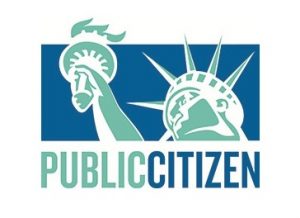
Big Pharma 101 and Affordable Prescriptions Made by Advancing the CREATES Act
It is estimated that the United States spends more than $500 billion dollars on prescription medicines each year. Total spending on drug therapies is about $371 billion dollars, including over-the-counter drug remedies, valued at 31 billion. A poll by the Kaiser Family Foundation found that 76% of Americans overall – and across party lines – say their top health care priority is ensuring that high-cost drugs for chronic conditions, such as HIV, hepatitis, mental illness and cancer, are affordable.
In a long overdue move, the U.S. Senate Judiciary Committee recently voted to advance the CREATES Act. It would prevent prescription corporations from abusing regulatory rules to deny generic medicines and biosimilar manufacturers access to product samples that allow these groups to obtain U.S. Food and Drug Administration approval and bring affordable products to market.
Corporations have long used this practice to delay the introduction of price-lowering generic and biosimilar competition. Brand-name manufacturers use it to inappropriately extend their monopolies. The Act aims to curb these abuses and promote competition. The U.S. Congressional Budget Office claims the Act will save $3.8 billion over the next 10 years.
Americans overwhelmingly support disciplining Big Pharma to help rein in pharmaceutical prices. The DC based group Public Citizen says that the CREATES Act begins to do that and cites it as a key structural reform that we can pass this year. It urges Congress should pass this legislation without delay.
Guest – Steven Knievel, Steven Knievel is a researcher and campaign organizer with Public Citizen’s Global Access to Medicines Program. He works with governments and public interest groups around the world to promote the use of flexibilities in patent and trade rules to promote access to medicines for all. He also works to mitigate the deleterious effects of corporate influence in trade negotiations on public health.
———

Civil Liberties, Habeas Corpus, Human Rights, Political Prisoner, Prison Industry, Truth to Power
Podcast: Play in new window | Download
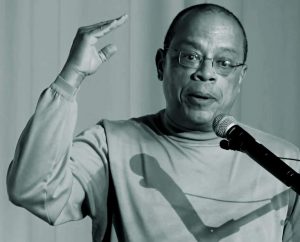

Who We Are: A Chronicle of Racism In America
In recent years, our guest, Attorney Jeffery Robinson has traveled the country speaking about the hidden history of race in America. It is a history he maintains that has been stolen from all of us. He will be speaking on this stolen history on June 19 at Townhall in New York City. His talk will be the basis for a feature documentary on the history of racism in America.
Guest – Attorney Jeffery Robinson, since graduating from Harvard Law School, Jeff has three decades of experience working on criminal and racial justice and reform issues. First, as a public defender representing indigent clients in state and then federal court in Seattle. Then, in private practice in Seattle at Schroeter, Goldmark & Bender where he represented a broad range of clients on charges ranging from shoplifting to securities fraud and first degree murder. He has tried over 200 criminal cases to verdict and more than a dozen civil cases representing plaintiffs suing corporate and government entities. Jeff was one of the original members of the John Adams Project, enabling him to work on behalf of one of five men held at Guantanamo Bay charged with the 9-11 attacks. Jeff is also a respected teacher of trial advocacy. He has lectured on trial skills all over the United States. Since 2012, Jeff has done work to educate himself and others about little known facts of the history of America’s practice of white supremacy related to African Americans. He speaks to diverse audiences across the country on the role of race in the criminal justice system and beyond. In 2015, Jeff joined the ACLU National office in New York where he continues this important work.
—-
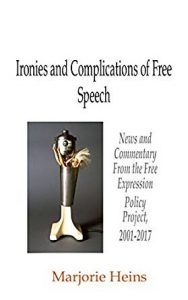
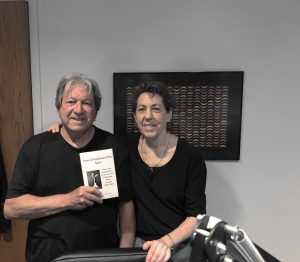
Ironies and Complications of Free Speech: News and Commentary From the Free Expression Policy Project, 2001-2017
The Free Expression Policy Project was a little think tank that delved into the problem of censorship in our society. Until 2017 it was headed up by civil liberties lawyer and author Marjorie Heins. The First Amendment ostensibly protects free speech and free expression. But there are exceptions. It also separates church from state, but here too there are exceptions. We speak with attorney Marjorie Heins about this. Her book Ironies and Complications of Free Speech: News and Commentary From the Free Expression Policy Project, 2001-2017 has just been published.
Guest – Attorney Marjorie Heins, is a civil liberties lawyer, writer, and teacher, and the founding director of the Free Expression Policy Project. Her previous book, Not in Front of the Children, won the American Library Association’s 2002 Eli Oboler Award for best published work in the field of intellectual freedom. Other books include Sex, Sin, and Blasphemy: A Guide to America’s Censorship Wars; Cutting the Mustard: Affirmative Action and the Nature of Excellence; and Strictly Ghetto Property: The Story of Los Siete de la Raza. She is a graduate of Harvard Law School.
——————

——————
Civil Liberties, Criminalizing Dissent, Human Rights, Supreme Court, Truth to Power, War Resister
Podcast: Play in new window | Download


Lawyers You’ll Like: Attorney Nancy Stearns
In 1970, an unusual legal team came together in what would become a landmark case challenging New York’s restrictive abortion ban. The case was Abramowicz v. Lefkowitz, and the team consisted of all women, many of whom had just a few years of legal practice. The premise was equally unusual at the time: its critical testimony came directly from women who had had illegal abortions, lack of contraceptive access, and painful experiences either from adoption or forced motherhood.
One of those attorneys included Nancy Stearns. After the Abramowicz case influenced the state’s passage of the nation’s most liberal abortion law before Roe v. Wade, Nancy would go on to bring successful challenges to abortion laws in NJ, CT, RI and MA.
Nancy attended law school after working with the Student Nonviolent Coordinating Committee (SNCC) in Atlanta. For 12 years at the Center for Constitutional Rights she worked on a number of significant civil rights cases, including challenging New York City’s mandatory pregnancy leave policy in Monell v. Department of Social Services that resulted in a Supreme Court ruling that municipalities are liable for damages under 42 U.S.C. 1983. She represented members of Vietnam Veterans Against the War in a federal criminal conspiracy prosecution arising from anti-war protests, and she litigated to reunite families separated by the Babylift, in which Vietnamese infants and young children were brought to the U.S. for adoption at the close of the Vietnam War, despite having living parents.
Nancy is also an accomplished cabaret singer, making the circuit in New York City. She is a longtime member of the National Lawyers Guild; in fact the Guild’s Chapter is honoring Nancy and her exemplary career at its annual Spring Fling on June 8, 2018.
—-

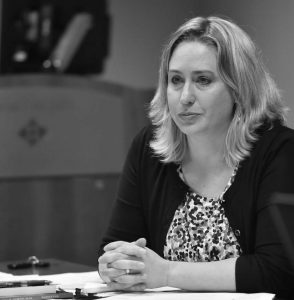
Cryptocurrencies
In 2008, Satoshi Nakamoto invented Bitcoin, the first and most prominent cryptocurrency, a peer-to-peer electronic cash system. While cryptocurrencies have become an international phenomenon, and many are aware of their importance, yet they are still not completely understood by large financial institutions, governments and much of the public. There are currently more than 1,500 cryptocurrencies, and the list continues to grow.
The general definition of cryptocurrencies are digital currencies using encryption techniques, hence the prefix crypto, to regulate the generation of unites of currency and verify the transfer of funds. This system operates independently of a central bank to create and outlet for personal wealth beyond restriction and confiscation. The U.S. Securities and Exchange Commission recently announced that it will be requiring digital asset exchanges to registers with the agency.
Guest – Professor Angela Walch teaches at St. Mary’s University School of Law. Her research focuses on money and the law, blockchain technologies, governance of emerging technologies and financial stability. She is a Research Fellow of the Centre for Blockchain Technologies of University College London. Walch was nominated for “Blockchain Person of the Year” for 2016 by Crypto Coins News for her work on the governance of blockchain technologies and her influential article in American Banker arguing that the coders and miners of public blockchains should be treated as fiduciaries.
——————

——————
CIA Sponsored Terror, Civil Liberties, Criminalizing Dissent, Gaza, Human Rights, Iran, Iraq War, Supreme Court, Truth to Power
Podcast: Play in new window | Download


Middle East Round Up: Brian Becker
Iran and Gaza are at both at critical and potentially catastrophic junctures. Iran faces new challenges due to because of Donald Trump’s denunciation of the 2015 nuclear deal with Iran and the re-imposition of sweeping sanctions. As well, recent elections in Iraq pushed Iran’s allies in Iraq’s Shia militias–the Popular Mobilization Forces—into second place by nationalist Moqtada al-Sadr.
The element within the Republican Party with deep pockets is the Republican Jewish Committee. They support Netanyahu and his Likud party. The RJC supported both the blowing up of the Iran deal and the move of the Embassy to Jerusalem. Now they support Netanyahu’s crushing of the Palestinians in Gaza.
Iran also risks being diplomatically out-maneuvered. Israel Prime Minister Benjamin Netanyahu was in Moscow recently, aligning his interests in Syria with Vladimir Putin’s. In what is becoming routine coordination, Israel forewarned Russia of its attacks on Iran. Viewed from Tehran, Russia, Iran’s ostensible brother-in-arms in Syria, is more and more unreliable. Its Saudi foes are greatly encouraged by Trump’s offensive.
Guest – Brian Becker, the National Coordinator of the ANSWER Coalition and a leader of the Party for Socialism and Liberation. Brian has been a central organizer of the mass anti-war demonstrations that have taken place in Washington, D.C. in the past decade.
—-
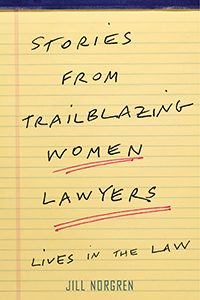
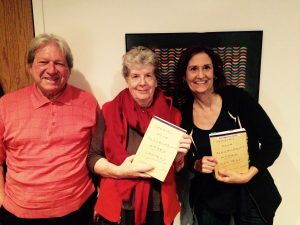
Stories From Trailblazing Women Lawyers
Before the Civil War there were six women lawyers in the entire United States of America. By 1890 there were about 200 and by 1900 about 1000. Women then could not even vote.
It was nearly impossible for a woman to get admitted to a law school or find a job when she graduated. Things did not qualitatively change until the late 1960s and 1970s.
By then, as a consequence of a number of factors including the great civil rights movement, the women’s movement, and the empty law school seats created by drafting men to serve in the Vietnam War, women were able to fight discrimination and win law school admission first by protesting in the streets and then through legislation, court decisions, and the actions of a few forward looking politicians.
Now half of the students in American law schools are women. They are professors in those very same places, indeed, the deans of the two most prestigious law schools in America, Harvard and Yale, are women. They are partners in law firms, hold important positions and governmental agencies, and are judges on the bench.
They have made a difference in the measure of social justice obtained by people in this country by advancing peoples’ and women’s rights in education, healthcare, employment, discrimination, family life, and violence against women.
Guest –Jill Norgren, the author of the just published book Stories From Trailblazing Women Lawyers. Ms. Norgren is Professor Emerita of Political Science at John Jay College and the Graduate Center, the City University of New York. She is the author of several books including Rebels at the Bar.
————————
Academic Freedom, Civil Liberties, Criminalizing Dissent, Human Rights, Truth to Power, War Resister
Podcast: Play in new window | Download

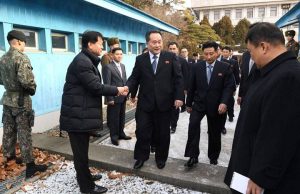
North and South Korea Diplomacy
In a historic diplomatic break-through the leaders of North Korea and South Korea met earlier this month. The North Korean leader Kim Jung-Un promised to give up his country’s nuclear weapons declaring that its not necessary to have them if the United States formally ends it’s provocations and promises not to launch any military aggression against his country. He promised that North Korea will dismantle is nuclear test site in Punggye-ri in May.
The Korean War which began in 1950 came to an end in 1953. An armistice was signed but peace was never officially declared and the two countries have been officially at war ever since.
This state of affairs will hopefully be resolved. At the meeting, South Korean President Moon Jae-in embraced North Korean leader Kim Jong-un after signing the Panmunjom Declaration for Peace, Prosperity, and Unification of the Korean Peninsula.
Guest – Attorney Jim Lafferty is one of the leaders of the anti-Vietnam War movement and has remained a peace activist for five decades. Jim Lafferty is currently the head of the Los Angeles chapter of the National Lawyers Guild and an organizer of and speaker at last week’s Los Angeles teach-in on the Korean situation.
—-
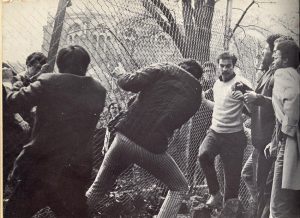

Columbia University Protests of 1968: Fifty Years Later
1968 was a momentous year. Huge historical events happened in the USA, Latin America, Europe, and Asia fifty years ago that shaped the course of history.
In France the students and workers came close to overthrowing capitalism in an advance capitalist country.
In Eastern Europe the Czechoslovakian people would’ve installed a democratic socialism, what they called socialism with a human face, but for the intervention by the power of Soviet Union which sent in troops to crush the uprising.
In Vietnam, the American war effort to prevent the Vietnamese people from determining their own destiny showed the world to be a losing proposition by the Tet Offensive. The Vietnamese National Liberation Front and the Hanoi coordinated military strikes throughout the south of their country, temporarily took over the southern capital of Saigon including the American Embassy.
Martin Luther King Jr. was assassinated in Memphis, Tennessee on April 4, 1968 provoking rebellion in the inner cities of the USA. Two weeks later the students, both black and white, rose up at Columbia University in New York City.
The African-American students demanded that the university stop encroaching in neighboring Harlem, where the university was planning to build a gymnasium for its students in a public park. They took over Hamilton Hall, a classroom building on the campus and received wide support from the Harlem community. The white students supported this demand. They took over four other buildings, including the administration building (Lowe Library) demanding that the University end its complicity in doing research that supported the American imperial war in Vietnam.
After a week of the student occupation, the New York City Police on behalf of the administration descended on the campus, violently beat the students, and arrested some 700 of them. They were defended by members of the National Lawyers Guild. After the arrests, the students went on strike. In the end the university’s complicity with the war in Vietnam and it’s landgrab in Harlem were ended.
Guest – Attorney Eleanor Stein, she was a law student at Columbia at the time and a participant in the student strike. She teaches a course called the Law of Climate Change: Domestic and Transnational at Albany Law School and SUNY Albany, in conjunction with the Environmental and Atmospheric Sciences Department at SUNY. Eleanor Stein is teaching transnational environmental law with a focus on catastrophic climate change. For ten years she served as an Administrative Law Judge at the New York State Public Service Commission in Albany, New York, where she presided over and mediated New York’s Renewable Portfolio Standard.
Guest – Professor Stefan Bradley whose primary research area is recent African-American history. He is the author of Harlem versus Columbia University: Black Student Power in the Late 1960s. Professor Bradley teaches at Loyola Marymount University in Los Angeles and is the chairperson of the African American studies department. He was a much appreciated participant in last weeks conference on the Columbia strike.
—————————————-
CIA Sponsored Terror, Civil Liberties, Human Rights, Iran, Political Prisoner, Prison Industry, Surveillance, Targeting Muslims, Truth to Power, War Resister
Podcast: Play in new window | Download


Political Analysis: United States Attacks On Syria
The recent American cruise missile attack on alleged chemical war infrastructure in Douma, Syria have been defended as legitimate, if not legal. Trump called Syrian president Assad “ an animal“ who gassed his own people and had to be deterred from further attacks on them.
Critics of the attack have said that it violated both American and international law and risked nuclear warfare. They argued that our Constitution states that only Congress can declare war, that there was no question of self-defense, that the United States was under attack, and that in any case The United Nations charter, to which the United States is a signatory, precludes what United States did. The UN charter is a treaty which binds America and is part of American law.
Guest – Attorney Marjorie Cohn, professor emerita at Thomas Jefferson School of Law and former NLG president. My book, ‘Drones and Targeted Killing: Legal, Moral, and Geopolitical Issues,’ was recently published in a second, updated edition. marjoriecohn.com.
—-


Inside Iran: The Real History And Politics Of The Islamic Republic Of Iran
Medea Benjamin presented a powerful book talk at the A.J Muste Memorial Institute. Medea was introduced by our own Heidi Boghosian.
Medea Benjamin is the co-founder of the women-led peace group CODEPINK and the co-founder of the human rights group Global Exchange. She has been an advocate for social justice for more than 40 years. Described as “one of America’s most committed — and most effective — fighters for human rights” by New York Newsday, and “one of the high profile leaders of the peace movement” by the Los Angeles Times, she was one of 1,000 exemplary women from 140 countries nominated to receive the Nobel Peace Prize on behalf of the millions of women who do the essential work of peace worldwide. She received numerous prices, including: the Martin Luther King, Jr. Peace Prize from the Fellowship of Reconciliation, the Peace Prize by the US Peace Memorial, the Gandhi Peace Award, and the Nuclear Age Peace Foundation Award. She is a former economist and nutritionist with the United Nations and World Health Organization.
——————-

——————-
























